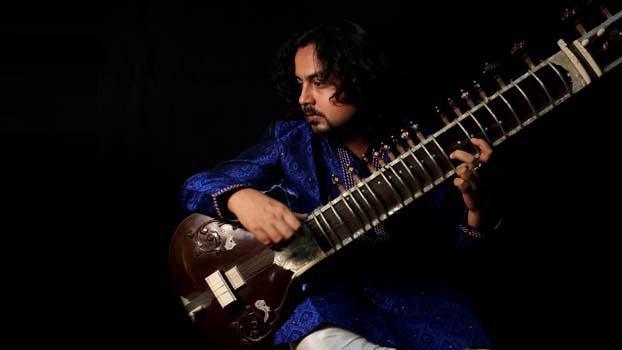Interview with Shouvik Mukherjee

Sayeed Shuvro
I was recently fortunate to have a conversation with Shouvik Mukherjee who is one of the finest musicians of the younger generations from India. He is at ease with the traditional classical as well as the new age music of today. His creative finesse is evident inHindustani Classical Music; while his predilection for auspiciously fusing cross-genre music into seamless tracks has been already acknowledged throughout India.
How did your musical journey start?
It started in my early age with my father Sri Udit Kumar Mukherjee who used to play Sitar. Then I started taking talim from the eminent sitarist Sri Bimal Chatterjee and currently I am taking talim from the sitar maestro P. Kushal Das.
How did academic background help your musical thinking?
I was born and brought up in a musical family. My father was a sitarist and my mother is a very good Rabindra Sangeet vocalist. My elder brother, Sri Abhik Mukherjee is also a well-known Sitar player. Therefore, I was always surrounded by musical ambiance. Later on, after my schooling, I completed my higher degrees from RabindraBharati University, so that I can brush up my musical knowledge to the finest.
Share the journey of your band Rishop ‘Rishop’ was my first band and it will always remain close to my heart. The band was formed in 2008 and it was a purely instrumental band. There were seven members in the band. Rishop performed in many prestigious places and got appreciated. Our first album “Flame’ launched in 2009.
Being an instrumentalist and expert in Hindustani Classical music, how would you differentiate between Hindustani Classical music and Western Classical music?
In both the respective genre, you need to build your own expertise so that you can improvise your ability through music. In Hindustani Classical music we have Ragas, which has certain emotions and as an instrumentalist we need to explore that emotion through our playing where the Raga-Rup is more important than the techniques. In Western Classical Music the main focus is on the techniques. Hindusthani Classical music is vivid, unbounded in its verse. On other hand Western Classical music is composed bounded in its verse - in my assumption.
What is the present situation of contemporary musical education in South Asia?
I don’t have much knowledge about the situation of contemporary music of south Asia. While visiting some places in India and Bangladesh, I found Institutions organizations which is encouraging young talents to create good music.

What steps can be taken to popularize classical music to a greater number of audiences?
Music is not a physical product with objectively measurable benefits. It is an experiential product and its perceived benefits are intensely personal and subjective. As a whole I would request to media to promote more programme on Classical music which will enrich our culture and for us it is our duty to preserve the heritage and carry away the Guru- Shishya parampara of Classical music for the future generations.
Share your musical achievements and significant musical memories.
I was awarded first prize in the field of sitar in Inter-School Competition organised by Sutanuti Parishad and had got an invitation for a Solo Programme at Sovabazar Raj Bari (Palace) organized by Sutanuti Parishad, Kolkata.
Amongst many achievements and awards, I can remember my first television programme telecasted on the “Tara Music” channel named, ‘Jalshaghor’.
I played in a special concert in Raj Bhavan (Governer’s Place) in Kolkata, in 2010.
I was selected as an “All India Radio” artist in 2012.
Also I have played and worked with many eminent Musicians like Pt. Mallar Ghosh, Music Director Debojyoti Mishra, SouravMoni and so on. Performed in many prestigious places in India like Belur Math, Behela Classical Festival, Golpark Ramakrishna Mission, Rachi, Bangalore, Patna, Kappa T.V of Kerala and so on. In abroad I have performed in Indian Embassy of Berlin, Cologne, Hamburg,Dusseldorf, France, Switzerland, Belgium, Denmark , FABRIK, Hamburg-Altona, Indian Embassy-Den-Hague, Cultuurhuis Heerlen, Très-Sainte-TrinitéStrasbourg, India Week, Hamburg, Theater am , also Performed in “Fest in IndischenDorf”, Rathausplatz, Althütte, Germany and so on.
How your musical idols and gurus inspired you?
My Guru and my elder brother Abhik Mukherjee are my greatest inspirations. My guru Pt. Kushal Das helped me to enlighten my path and shunned the darkness which swayed my way through his impregnable knowledge and effort in the subject.
Any suggestion for the new classical learners?
Practice and dedication is the key to the success. Practice in a right way, follow your Guru whole heartedly and adopt the skill of listening good music will sharpen your musical skills.




